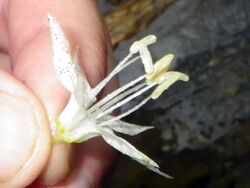Biology:Prosartes maculata
From HandWiki
Short description: Species of flowering plant
| Prosartes maculata | |
|---|---|

| |
| Scientific classification | |
| Kingdom: | Plantae |
| Clade: | Tracheophytes |
| Clade: | Angiosperms |
| Clade: | Monocots |
| Order: | Liliales |
| Family: | Liliaceae |
| Genus: | Prosartes |
| Species: | P. maculata
|
| Binomial name | |
| Prosartes maculata (Buckley) A. Gray
| |
| Synonyms[1] | |
| |
Prosartes maculata is a North American species of plants in the lily family with the common names yellow mandarin,[2] spotted mandarin, or nodding mandarin.[3][4] It is a perennial plant that flowers in the spring.[5][6][7]
It is a native plant of the Great Smoky Mountains and occurs in other parts of the Appalachian region from northern Georgia and northeastern Alabama to southern West Virginia and southern Ohio. There are old reports of isolated populations from near Detroit, Michigan, but these appear now to have been lost to urban development.[8]
Prosartes maculata is a herb that grows up to 80 cm tall. Its flowers are bell-shaped, nodding (hanging downward), cream-colored with purple spots.[3]
References
- ↑ Kew World Checklist of Selected Plant Families
- ↑ "Prosartes maculata". Natural Resources Conservation Service PLANTS Database. USDA. https://plants.usda.gov/core/profile?symbol=PRMA14. Retrieved 14 October 2015.
- ↑ 3.0 3.1 Flora of North America, Prosartes maculata
- ↑ Horn, Cathcart, Hemmerly, Duhl, Wildflowers of Tennessee, the Ohio Valley, and the Southern Appalachians, Lone Pine Publishing, (2005) p 413, ISBN:978-1-55105-428-5,
- ↑ Buckley, Samuel Botsford. 1843. American Journal of Science, and Arts 45(1): 170–171, as Streptopus maculatus
- ↑ Gray, Asa. 1844. American Journal of Science, and Arts 47(1): 201, Prosartes maculata
- ↑ Britton, Nathaniel Lord. 1888. Bulletin of the Torrey Botanical Club 15(7): 188, as Disporum maculatum
- ↑ Biota of North America Program 2013 county distribution map
Wikidata ☰ Q14613590 entry
 |


